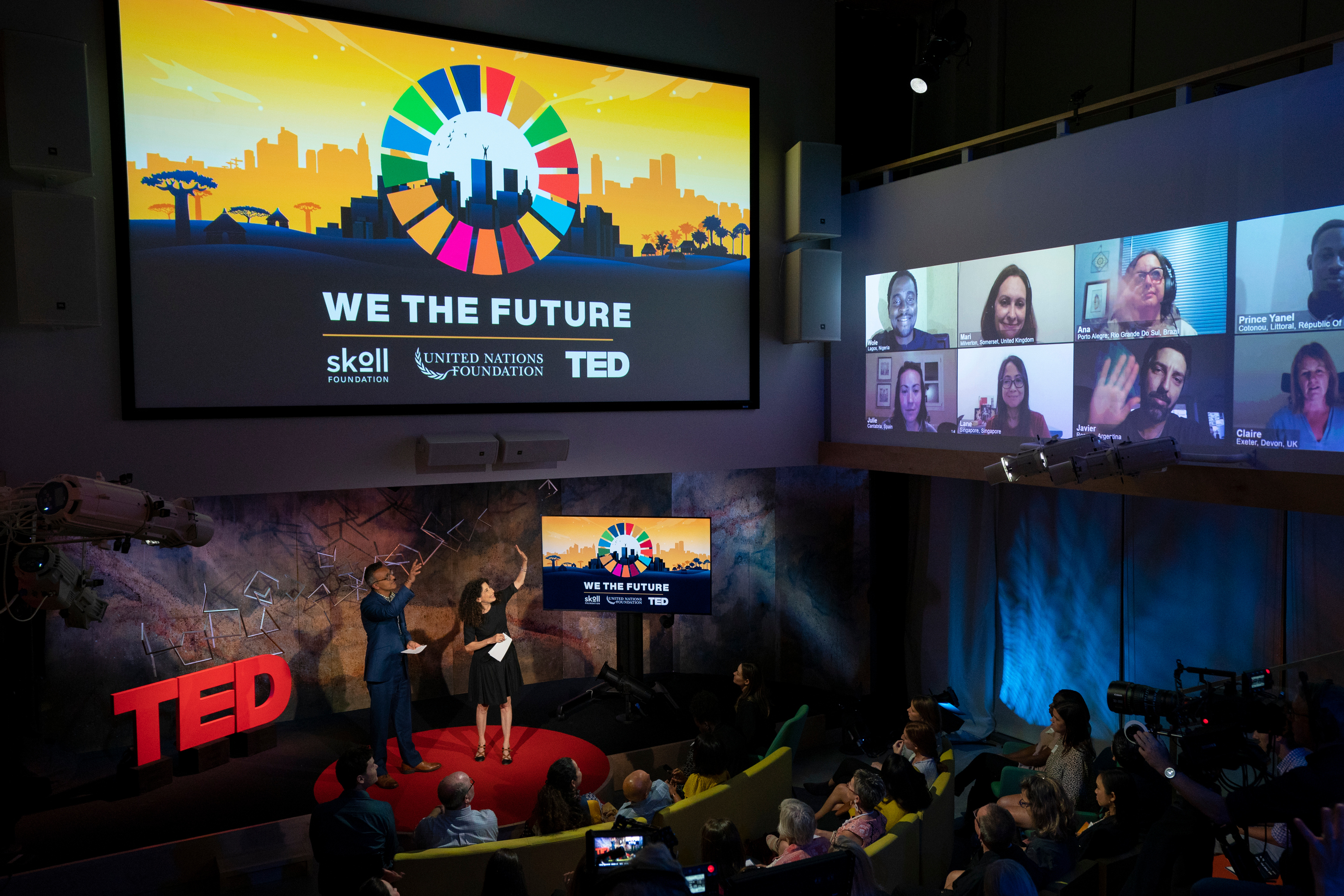
Hosts Rajesh Mirchandani and Chee Pearlman wave to “We The Future” attendees who watched the salon live from around the world through TED World Theater technology. (Photo: Ryan Lash / TED)
At “We the Future,” a day of talks from TED, the Skoll Foundation and the United Nations Foundation at the TED World Theater in New York City, 18 speakers and performers shared daring ideas, deep analysis, cautionary tales and behavior-changing strategies aimed at meeting the UN Sustainable Development Goals (SDGs), the global goals created in partnership with individuals around the world and adopted at the United Nations in 2015.
The event: We the Future, presented by TED, the Skoll Foundation and the United Nations Foundation to share ingenious efforts of people from every corner of the globe
When and where: Tuesday, September 24, 2019, at the TED World Theater in New York, NY
Music: Queen Esther with Hilliard Greene and Jeff McLaughlin, performing the jazzy “Blow Blossoms” and the protest song “All That We Are”
The talks in brief:
David Wallace-Wells, journalist
Big idea: The climate crisis is too vast and complicated to solve with a silver bullet. We need a shift in how we live: a whole new politics, economics and relationship to technology and nature.
Why? The climate crisis isn’t the legacy of our ancestors, but the work of a single generation — ours, says Wallace-Wells. Half of all the emissions from the burning of fossil fuels in the history of humanity were produced in the last 30 years. We clearly have immense power over the climate, and it’s put us on the brink of catastrophe — but it also means we’re the ones writing the story of our planet’s future. If we are to survive, we’ll need to reshape society as we know it — from building entirely new electric grids, planes and infrastructures to rethinking the way the global community comes together to support those hit hardest by climate change. In we do that, we just might build a new world that’s livable, prosperous and green.
Quote of the talk: “We won’t be able to beat climate change — only live with it and limit it.”
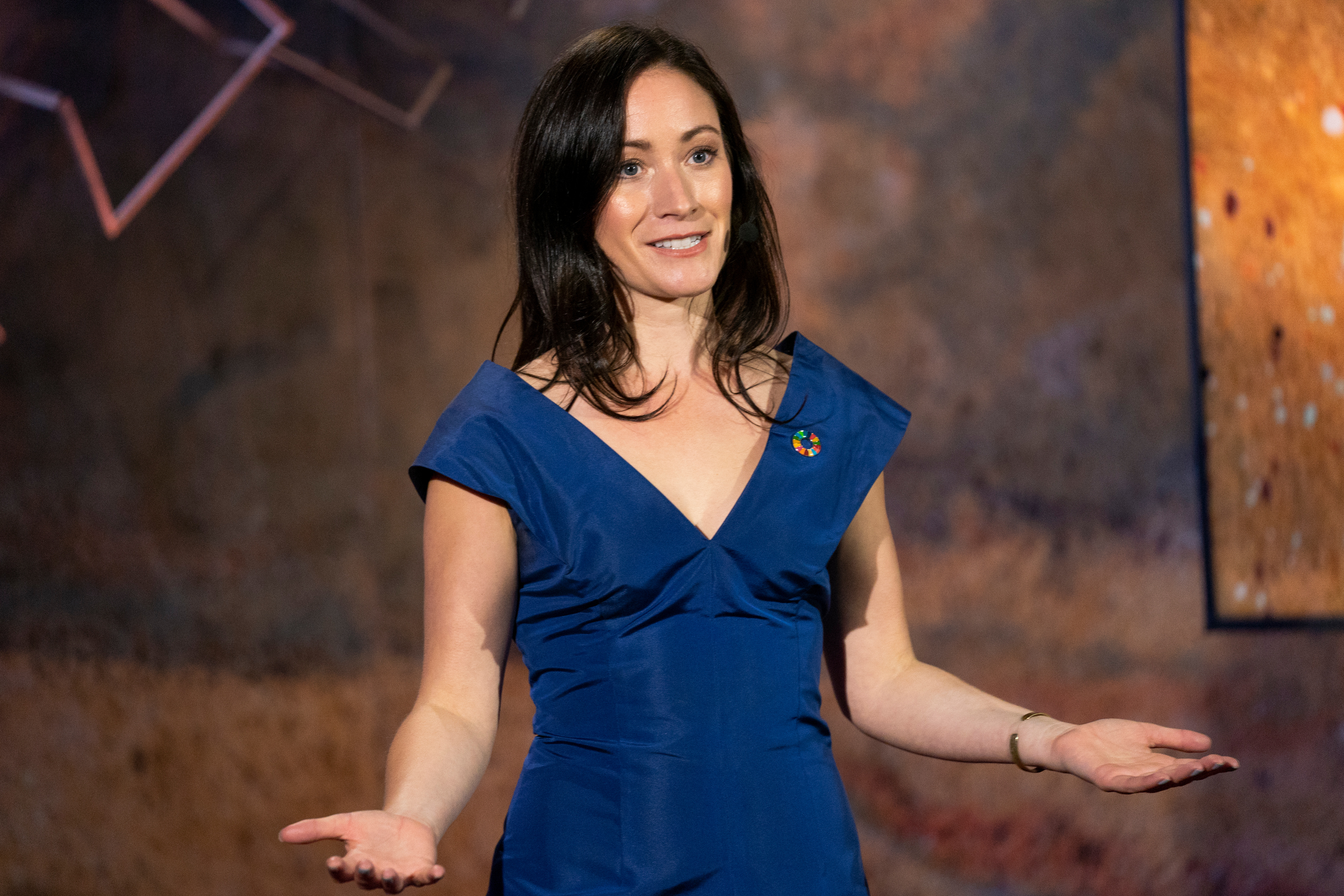
“When the cost of inaction is that innocent children are left unprotected, unvaccinated, unable to go to school … trapped in a cycle of poverty, exclusion and invisibility, it’s on us to take this issue out of darkness and into the light,” says legal identity expert Kristen Wenz. She speaks at “We The Future” on September 24, 2019, at the TED World Theater in New York, NY. (Photo: Ryan Lash / TED)
Kristen Wenz, legal identity expert
Big idea: More than one billion people — mostly children — don’t have legal identities or birth certificates, which means they can’t get vital government services like health care and schooling. It’s a massive human rights violation we need to fix.
How? There are five key approaches to ensuring children are registered and protected — reduce distance, reduce cost, simplify the process, remove discrimination and increase demand. In Tanzania, the government helped make it easier for new parents to register their child by creating an online registration system and opening up registration hubs in communities. The results were dramatic: the number of children with birth certificates went from 16 to 83 percent in just a few years. By designing solutions with these approaches in mind, we can provide better protection and brighter opportunities for children across the world.
Quote of the talk: “When the cost of inaction is that innocent children are left unprotected, unvaccinated, unable to go to school … trapped in a cycle of poverty, exclusion and invisibility, it’s on us to take this issue out of darkness and into the light.”
Don Gips, CEO of the Skoll Foundation, in conversation with TEDWomen curator and author Pat Michell
Big idea: Don Gips turned away from careers in both government and business and became CEO of the Skoll Foundation for one reason: the opportunity to take charge of investing in solutions to the most urgent issues humanity faces. Now, it’s the foundation’s mission to identify the investments that will spark the greatest changes.
How?
By reaching deeper into communities and discovering and investing in social entrepreneurs and other changemakers, the Skoll Foundation supports promising solutions to urgent global problems. As their investments yield positive results, Gips hopes to inspire the rest of the philanthropic community to find better ways to direct their resources.
Quote of the interview: “We don’t tell the changemaker what the solution is. We invest in their solution, and go along on the journey with them.”
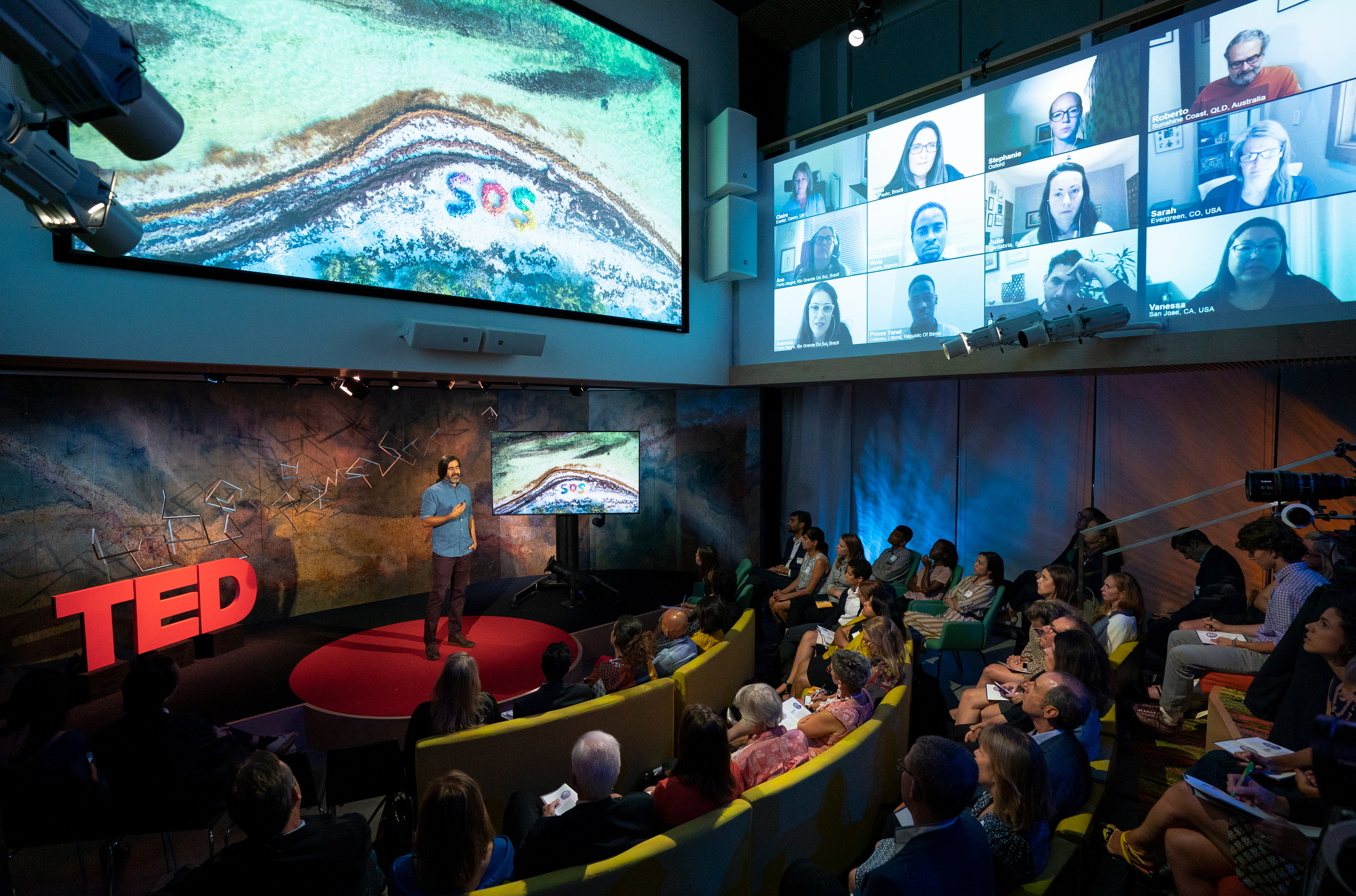
“By making aesthetic, some might say beautiful, arrangements out of the world’s waste, I hope to hook the viewer, to draw in those that are numb to the horrors of the world, and give them a different way to understand what is happening,” says artist Alejandro Durán. He speaks at “We The Future” on September 24, 2019, at the TED World Theater in New York, NY. (Photo: Ryan Lash / TED)
Alejandro Durán, artist
Big Idea: Art can spotlight the environmental atrocities happening to our oceans — leaving viewers both mesmerized and shocked.
Why? From prosthetic legs to bottle caps, artist Alejandro Durán makes ephemeral environmental artworks out of objects he finds polluting the waters of his native region of Sian Ka’an, Mexico. He meticulously organizes materials by color and curates them into site-specific work. Durán put on his first “Museo de La Basura or Museum of Garbage“ exhibition in 2015, which spoke to the horrors of the Great Pacific Garbage Patch, and he’s still making art that speaks to the problem of ocean trash. By endlessly reusing objects in his art, Durán creates new works that engage communities in environmental art-making, attempting to depict the reality of our current environmental predicament and make the invisible visible.
Quote of the talk: “By making aesthetic, some might say beautiful, arrangements out of the world’s waste, I hope to hook the viewer, to draw in those that are numb to the horrors of the world, and give them a different way to understand what is happening.”
Andrew Forrest, entrepreneur, in conversation with head of TED Chris Anderson
Big idea: The true — and achievable! — business case for investing in plastic recycling.
How? Since earning his PhD in marine ecology, Forrest has dedicated his time and money to solving the global plastic problem, which is choking our waterways and oceans with toxic material that never biodegrades. “I learned a lot about marine life,” he says of his academic experience. “But it taught me more about marine death.” To save ourselves and our underwater neighbors from death by nanoplastics, Forrest says we need the big corporations of the world to fund a massive environmental transition that includes increasing the price of plastic and turning the tide on the recycling industry.
Quote of the talk: “[Plastic] is an incredible substance designed for the economy. It’s the worst substance possible for the environment.”
Raj Panjabi, cofounder of medical NGO Last Mile Health
Big idea: Community health workers armed with training and technology are our first line of defense against deadly viral surges. If we are to fully protect the world from killer diseases, we must ensure that people living in the most remote areas of the planet are never far from a community health worker trained to throttle epidemics at their outset.
How? In December 2013, Ebola broke out in West Africa and began a transborder spread that threatened to wipe out millions of people. Disease fighters across Africa joined the battle to stop it — including Liberian health workers trained by Last Mile Health and armed with the technology, knowledge and support necessary to serve their communities. With their help, Ebola was stopped (for now), after killing 11,000 people. Panjabi believes that if we train and pay more community health workers, their presence in underserved areas will not only stop epidemics but also save the lives of the millions of people threatened by diseases like malaria, pneumonia and diarrhea.
Quote of the talk: “We dream of a future when millions of people … can gain dignified jobs as community health workers, so they can serve their neighbors in the forest communities of West Africa to the fishing villages of the Amazon; from the hilltops of Appalachia to the mountains of Afghanistan.”
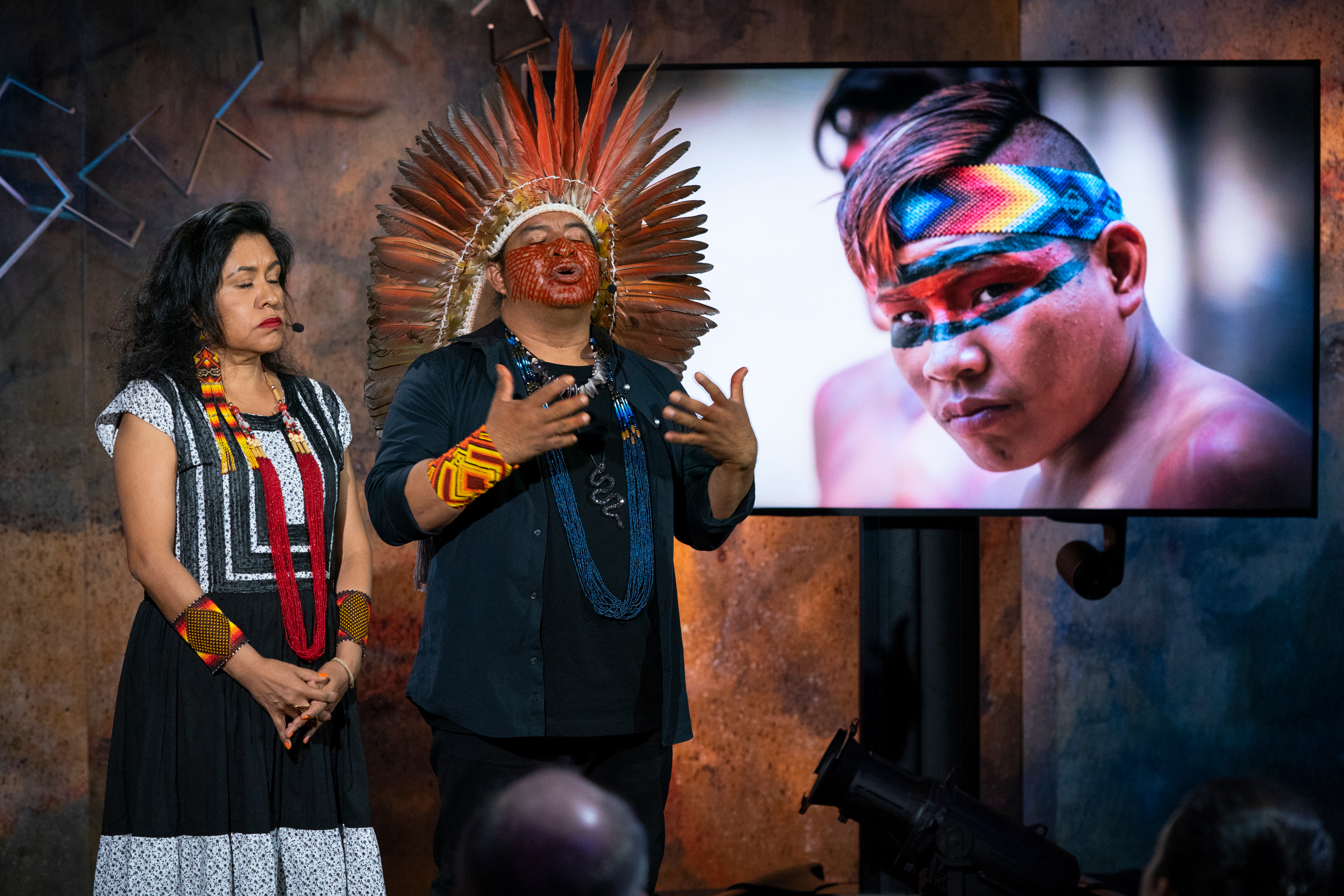
“Indigenous people have the answer. If we want to save the Amazon, we have to act now,” says Tashka Yawanawá, speaking at “We The Future” with his wife, Laura, on September 24, 2019, at the TED World Theater in New York, NY. (Photo: Ryan Lash / TED)
Tashka and Laura Yawanawá, leaders of the Yawanawá in Acre, Brazil
Big idea: To save the Amazon rainforest, let’s empower indigenous people who have been coexisting with the rainforest for centuries.
Why? Tashka Yawanawá is chief of the Yawanawá people in Acre, Brazil, leading 900 people who steward 400,000 acres of Brazilian Amazon rainforest. As footage of the Amazon burning shocks the world’s consciousness, Tashka and his wife, Laura, call for us to transform this moment into an opportunity to support indigenous people who have the experience, knowledge and tools to protect the land.
Quote of the talk: “Indigenous people have the answer. If we want to save the Amazon, we have to act now.”
Alasdair Harris, ocean conservationist
Big idea: To the impoverished fishers that rely on the sea for their food, and who comprise 90 percent of the world’s fishing fleet, outside interference by scientists and marine managers can seem like just another barrier to their survival. Could the world rejuvenate its marine life and replenish its fish stocks by inspiring coastal communities rather than simply regulating them?
How? When he first went to Madagascar, marine biologist Alasdair Harris failed to convince local leaders to agree to a years-long plan to close their threatened coral reefs to fishing. But when a contained plan to preserve a breeding ground for an important local species of octopus led to rapid growth in catches six months later, the same elders banded together with leaders across Madagascar to spearhead a conservation revolution. Today, Harris’s organization Blue Ventures works to help coastal communities worldwide take control of their own ecosystems.
Quote of the talk: “When we design it right, marine conservation reaps dividends that go far beyond protecting nature — improving catches, driving waves of social change along entire coastlines, strengthening confidence, cooperation and the resilience of communities to face the injustice of poverty and climate change.”
Bright Simons, social entrepreneur and product security expert
Big idea: A global breakdown of the trustworthiness of markets and regulatory institutions has led to a flurry of counterfeit drugs, mislabeled food and defective parts. Africa has been dealing with counterfeit goods for years, and entrepreneurs like Bright Simons have developed myriad ways consumers can confirm that their food and drug purchases are genuine. Why are these methods ignored in the rest of the world?
How? Bright Simons demonstrates some of the innovative solutions Africans use to restore trust in their life-giving staples, such as text hotlines to confirm medications are real and seed databases to certify the authenticity of crops. Yet in the developed world, these solutions are often overlooked because they “don’t scale” — an attitude Simons calls “mental latitude imperialism.” It’s time to champion “intellectual justice” — and look at these supposedly non-scalable innovations with new respect.
Quote of the talk: “It just so happens that today, the most advanced and most progressive solutions to these problems are being innovated in the developing world.”
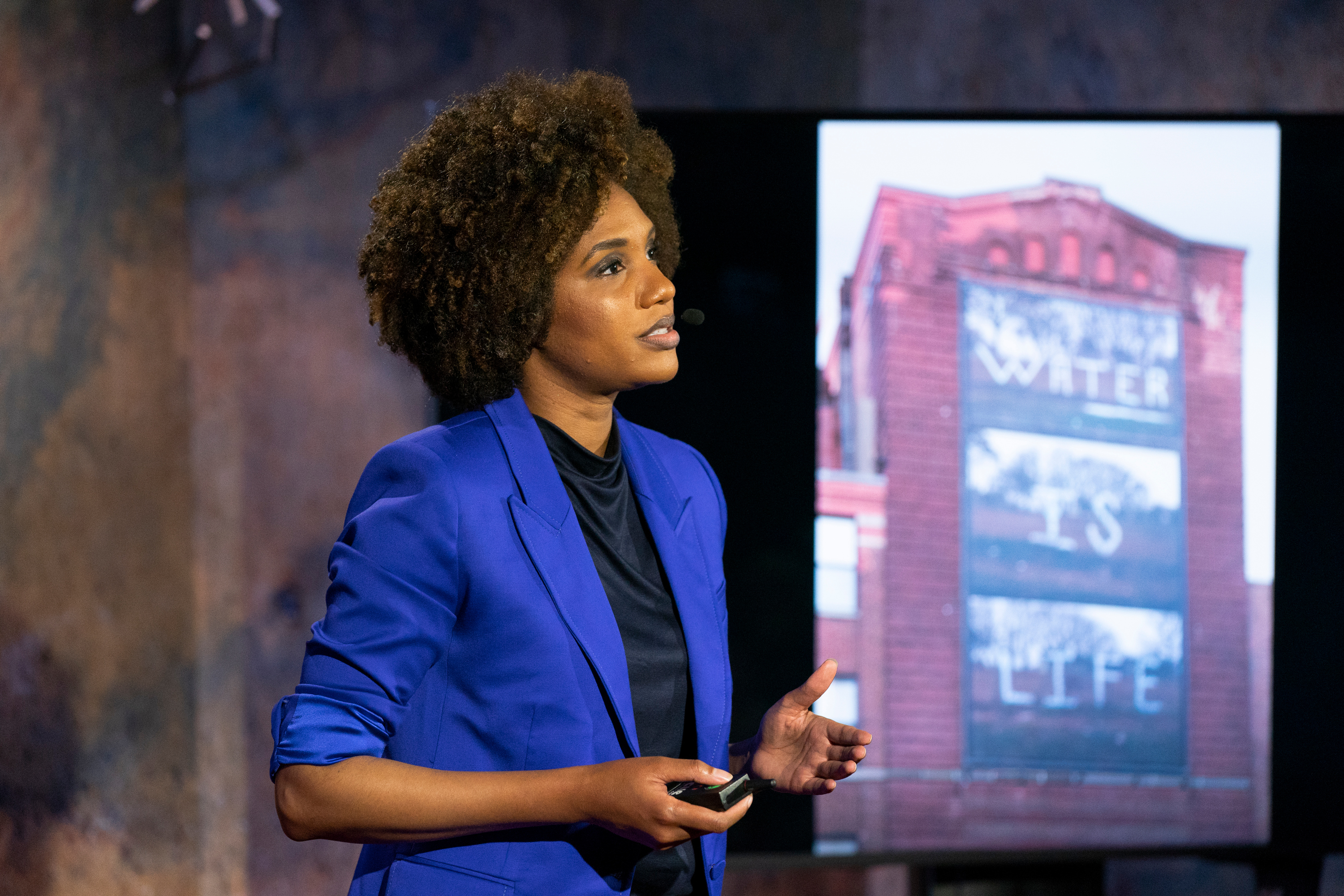
“Water is life. It is the spirit that binds us from sickness, death and destruction,” says LaToya Ruby Frazier. She speaks at “We The Future” on September 24, 2019, at the TED World Theater in New York, NY. (Photo: Ryan Lash / TED)
LaToya Ruby Frazier, artist
Big Idea: LaToya Ruby Frazier’s powerful portraits of women in Flint, Michigan document the reality of the Flint water crisis, bringing awareness to the ongoing issue and creating real, positive change.
How? Frazier’s portraits of the daily lives of women affected by the Flint water crisis are striking reminders that, after all the news crews were gone, the people of Flint still did not have clean water. For one photo series, she closely followed the lives of Amber Hasan and Shea Cobb — two activists, poets and best friends — who were working to educate the public about the water crisis. Frazier has continued collaborating with Hasan and Cobb to seek justice and relief for those suffering in Flint. In 2019, they helped raise funds for an atmospheric water generator that provided 120,000 gallons of water to Flint residents.
Quote of the talk: “Water is life. It is the spirit that binds us from sickness, death and destruction. Imagine how many millions of lives we could save if [the atmospheric water generator] were in places like Newark, New Jersey, South Africa and India — with compassion instead of profit motives.”
Cassie Flynn, global climate change advisor
Big idea: We need a new way to get citizen consensus on climate change and connect them with governments and global leaders.
How? The United Nations is taking on an entirely new model of reaching the masses: mobile phone games. Flynn shares how their game “Mission 1.5” can help people learn about their policy choices on climate change by allowing them to play as heads of state. From there, the outcomes of their gameplay will be compiled and shared with their national leaders and the public. Flynn foresees this as a fresh, feasible way to meet citizens where they are, to educate them about climate change and to better connect them to the people who are making those tough decisions.
Quote of the talk: “Right now, world leaders are faced with the biggest and most impactful decisions of their entire lives. What they decide to do on climate change will either lead to a riskier, more unstable planet or a future that is more prosperous and sustainable for us all.”
Wanjira Mathai, entrepreneur
Big Idea: Corruption is a constant threat in Kenya. To defeat it there and anywhere, we need to steer youth towards integrity through education and help them understand the power of the individual.
Why? In 1989, the Karura Forest, a green public oasis in Nairobi, Kenya, was almost taken away by a corrupt government until political activist Wangari Maathai, Nobel Prize recipient and founder of the Greenbelt Movement, fought back fiercely and won. Continuing Maathai’s legacy, her daughter Wanjira explains how corruption is still very much alive in Kenya — a country that loses a third of its state budget to corruption every year. “Human beings are not born corrupt. At some point these behaviors are fostered by a culture that promotes individual gain over collective progress,” she says. She shares a three-pronged strategy for fighting corruption before it takes root by addressing why it happens, modeling integrity and teaching leadership skills.
Quote of the talk: “We cannot complain forever. We either decide that we are going to live with it, or we are going to change it. And if we are going to change it, we know that today, most of the world’s problems are caused by corruption and greed and selfishness.”